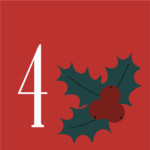There are many editing and plain language conferences planned this year.
A seasonal distraction: The Twelve Days of Christmas for copy editors
 The Twelve Days of Christmas: When we hear the phrase, most of us think of the popular seasonal song written by Frederic Austin, but historically it refers to the festival season, or Christmastide, which begins on December 25 (Christmas Day) and ends on January 5 (Twelfth Night). It is believed that Shakespeare’s Twelfth Night was so named because in Elizabethan times, the holiday season was notable by the “excess and license [that] were expected to run rampant…a time of merry-making, of hard drinking, and of romantic (or lusty) pursuits,” all of which are apparent in the play.
The Twelve Days of Christmas: When we hear the phrase, most of us think of the popular seasonal song written by Frederic Austin, but historically it refers to the festival season, or Christmastide, which begins on December 25 (Christmas Day) and ends on January 5 (Twelfth Night). It is believed that Shakespeare’s Twelfth Night was so named because in Elizabethan times, the holiday season was notable by the “excess and license [that] were expected to run rampant…a time of merry-making, of hard drinking, and of romantic (or lusty) pursuits,” all of which are apparent in the play.
We’ve taken great licence here, too, by co-opting the Twelve Days of Christmas theme for a bit of seasonal professional development merrymaking—a cheeky look at 12 changes in the newly released (and greatly anticipated) 18th edition of The Chicago Manual of Style (CMOS 18).
We chose these changes because they come up often in the daily work of copy editors, but they are just a few of the many updates in the 18th edition. You can find a full list of what’s new on the CMOS Online site.
 On the first day of Christmas, CMOS brought to me…
On the first day of Christmas, CMOS brought to me…
A new rule for capitalization after a colon (6.67)
You may have spent more time than you would have liked explaining to writers why sometimes a word is capitalized after a colon and sometimes it isn’t. CMOS 18 has simplified things, now saying that when a colon introduces one or more complete sentences, the first word following the colon should be capitalized.
Santa Claus had to make a decision: He could tell Rudolph his days as lead reindeer were numbered because his nose was fading, or he could buy a new environmentally responsible LED headlamp to guide his way on Christmas Eve, saving Rudy’s feelings and their centuries-long friendship.
This is a change from previous editions, which called for a capital letter only when there was more than one complete sentence following the colon.
 On the second day of Christmas, CMOS brought to me…
On the second day of Christmas, CMOS brought to me…
A new section with guidance on correcting comma splices (6.23)
We all know that run-on sentences are a no-no, and it is a copy editor’s job to correct them. Commonly, they appear as a comma splice (two independent clauses joined by a comma, with no coordinating conjunction). The correction is simple enough to make by adding a conjunction or changing the punctuation.
Incorrect: Santa’s reindeers are gearing up for their annual trek around the world, some of them have to get in shape first.
Correct: Santa’s reindeers are gearing up for their annual trek around the world, but some of them have to get in shape first.
Also correct: Santa’s reindeers are gearing up for their annual trek around the world; some of them have to get in shape first.
 On the third day of Christmas, CMOS brought to me…
On the third day of Christmas, CMOS brought to me…
A change to forming the plural of a capital letter (7.68)
Previous editions said no apostrophe was required in the plural of capital letters, but that has now changed.
Previous editions: Last year, Santa assigned the elves two As and a B for productivity, quality control, and serious workplace engagement, respectively.
CMOS 18: This year, the elves celebrated an improved workshop report card of straight A’s.
 On the fourth day of Christmas, CMOS brought to me…
On the fourth day of Christmas, CMOS brought to me…
An updated hyphenation table (7.96)
In the 15th edition, CMOS removed its invaluable hyphenation table. The response from editors was nothing short of outrage. The table returned in subsequent editions, and CMOS 18 presents several changes for the use of hyphens. Just two examples:
Santa will now be delivering ebooks, not e-books, to avid readers.
The elves will have to account for any toys that are half finished (rather than half-finished) on Christmas Eve.
Any seasoned copy editor knows that hyphen usage is style dependent and subject to change over time, so be sure to check out the full list when you have a moment this holiday season.
 On the fifth day of Christmas, CMOS brought to me…
On the fifth day of Christmas, CMOS brought to me…
A change for titles and offices of people used in apposition (8.22)
CMOS defines a title used in apposition as one that “is normally preceded by an adjective or an article that modifies or otherwise limits the title.” In a departure from previous editions, which lower cased these titles, CMOS 18 recommends capitalizing them. This change adds clarity and is a nod to common usage.
Previous editions: North Pole queen Mrs. Claus
CMOS 18: Former Chief Elves Bugsy and Cheerios
 On the sixth day of Christmas, CMOS brought to me…
On the sixth day of Christmas, CMOS brought to me…
More consistency in the titles of works (8.160)
In an effort to ease the work of making titles in texts, references, and notes consistent, prepositions of five letters or more are now capitalized (with certain exceptions).
Previous editions: For years, Santa relied on his GPS manual, Riding with the Reindeers around the World in 24 Hours among the Constellations.
CMOS 18: Wanting to stay current, the publisher has now updated all the maps, along with the title, to Riding with the Reindeers Around the World in 24 Hours Among the Constellations.
For more discussion on the principles of title case (referred to in previous editions as headline style), check out partner Merrie-Ellen Wilcox’s October post.
 On the seventh day of Christmas, CMOS brought to me…
On the seventh day of Christmas, CMOS brought to me…
Permission to start a sentence with a date (9.5)
After correcting scores of sentences beginning with a date, we’re now told it’s okay to “let it go.” And this makes sense as we all strive for improved readability.
Previous editions: Two hundred eighty AD is the generally agreed-on date of Santa’s birth.
CMOS 18: 280 AD is the generally agreed-on date of Santa’s birth.
But note that CMOS limits this change by saying it is preferable to preface the numeral with “The year.”
 On the eighth day of Christmas, CMOS brought to me…
On the eighth day of Christmas, CMOS brought to me…
A new use for en dashes (6.85)
When the names of two people are used as a compound modifier before a noun, they should be joined by an en dash, rather than a hyphen, to make it clear that the compound name belongs to both people and isn’t a hyphenated name.
The Santa–Cottontail air service covers most of the world’s gift deliveries from December through April.
 On the ninth day of Christmas, CMOS brought to me…
On the ninth day of Christmas, CMOS brought to me…
An expanded list of terms (Glossary)
The glossary in CMOS 18 is five pages longer than the one in the previous edition and now includes helpful definitions for the various levels of editing and where they fall in the process of producing a written work.
These additions have helped Santa’s elves who are no longer tripping over each other as they hurry to produce the many books requested by children around the world. Pepper Mintstix now knows he can’t start his copy editing until Sugarplum Mary has finished the developmental editing, no matter how tight the schedule is.
 On the tenth day of Christmas, CMOS brought to me…
On the tenth day of Christmas, CMOS brought to me…
Guidance on using punctuation with emojis (6.137).
One wonders what the editors of the early editions would have made of such an entry. But Santa is pleased to finally have clarification on how to sign off his letters to children. CMOS 18 advises that an emoji should be treated like a word, with a space on either side, unless a punctuation mark comes immediately before or after it.
Dear Johnny,
Mrs. Claus 🤶 has promised to try baking the reindeer shortbread recipe you sent to help keep Rudolph 🦌 and his pals 🦌🦌🦌🦌🦌🦌🦌🦌 well nourished on their long global flight 🛷. And I’ll be sure to get the elves working on your 🎁.
Love,
Santa 🎅
 On the eleventh day of Christmas, CMOS brought to me…
On the eleventh day of Christmas, CMOS brought to me…
A gift for cookbook editors (8.62)
More precisely, the 18th edition has updated the guidance on capitalizing words derived from geographic names to align more closely with common usage. The terms “french fries,” “brussels sprouts,” and “frankfurter” remain lower case, as they are considered “far enough removed from their literal meaning” of being related to, respectively, the French, Brussels, and Frankfurt. But cheeses—specifically Brie, Gruyère, Swiss, and Emmentaler (but not cheddar)—are now capitalized to acknowledge the close association with the region of origin.
Check out the full section for other updates to words derived from proper nouns.
 On the twelfth day of Christmas, CMOS brought to me…
On the twelfth day of Christmas, CMOS brought to me…
A suggestion to change your alphabetized Christmas wish list (15.66)
When you write to Santa this year, or prepare your next index, CMOS now prefers the word-by-word system of alphabetization over the letter-by-letter system.
If, last year, you asked for a:
newt
new yo-yo
puppy
pup tent
and all you got was a lump of coal, you might try again this year and refresh your list to:
new yo-yo
newt
pup tent
puppy
But if your list is long, don’t despair: Santa—and CMOS—will accept either if your list is well prepared!
For more usage fun over the holiday season, you might want to revisit last year’s Advent calendar for editors and writers.
Happy holidays from all of us at WCEA!



